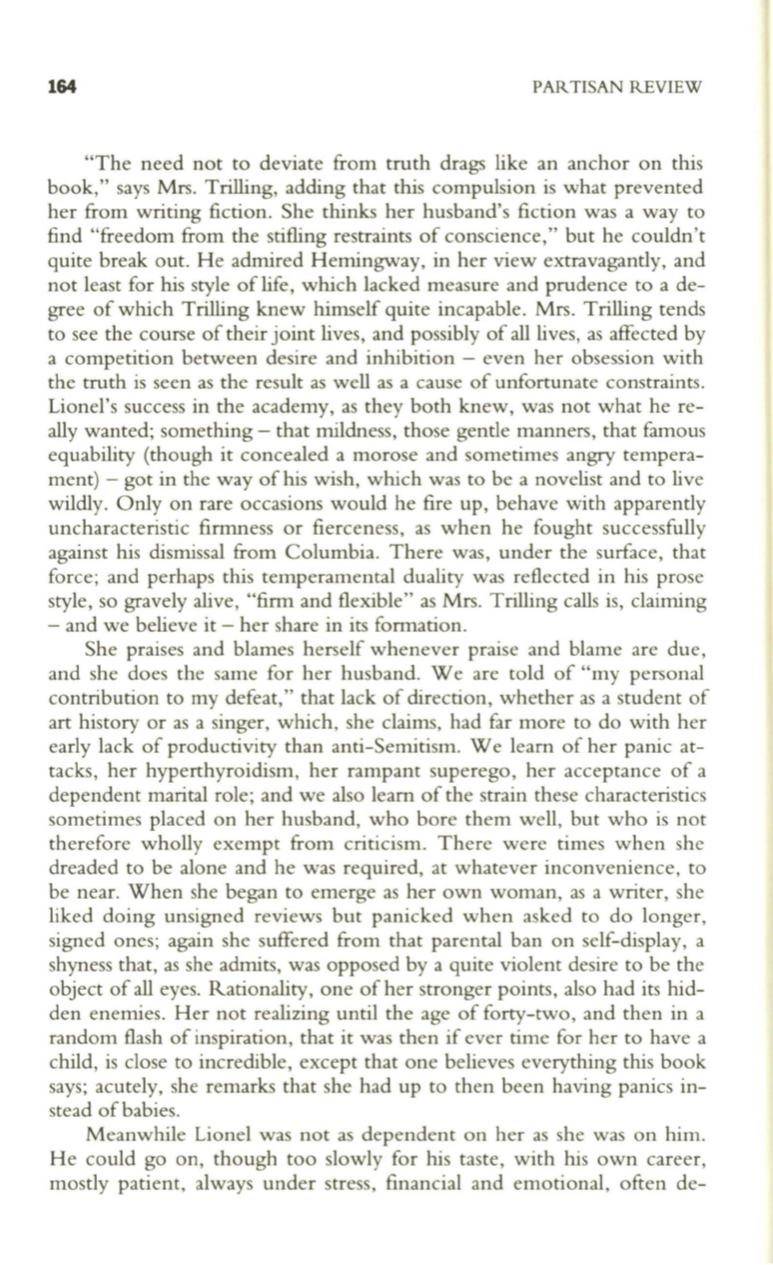
164
PARTISAN REVIEW
"The need not to deviate from truth drags like an anchor on this
book," says Mrs. Trilling, adding that this compulsion is what prevented
her from writing fiction. She thinks her husband's fiction was a way to
find "freedom from the stifling restraints of conscience," but he couldn't
quite break out. He admired Hemingway, in her view extravagantly, and
not least for his style oflife, which lacked measure and prudence to a de–
gree of which Trilling knew himself quite incapable. Mrs. Trilling tends
to see the course of their joint lives, and possibly of all lives, as affected by
a competition between desire and inhibition - even her obsession with
the truth is seen as the result as well as a cause of unfortunate constraints.
Lionel's success in the academy, as they both knew, was not what he re–
ally wanted; something - that mildness, those gentle manners, that famous
equability (though it concealed a morose and sometimes angry tempera–
ment) - got in the way of his wish, which was to be a novelist and to live
wildly. Only on rare occasions would he fire up, behave with apparently
uncharacteristic firmness or fierceness, as when he fought successfully
against his dismissal from Columbia. There was, under the surface, that
force; and perhaps this temperamental duality was reflected in his prose
style, so gravely alive, "firm and flexible" as Mrs. Trilling calls is, claiming
- and we believe it - her share in its formation.
She praises and blames herself whenever praise and blame are due,
and she does the same for her husband. We are told of "my personal
contribution to my defeat," that lack of direction, whether as a student of
art history or as a singer, which, she claims, had far more to do with her
early lack of productivity than anti-Semitism. We learn of her panic at–
tacks, her hyperthyroidism, her rampant superego, her acceptance of a
dependent marital role; and we also learn of the strain these characteristics
sometimes placed on her husband, who bore them well, but who is not
therefore wholly exempt from criticism. There were times when she
dreaded to be alone and he was required, at whatever inconvenience, to
be near. When she began to emerge as her own woman, as a writer, she
liked doing unsigned reviews but panicked when asked to do longer,
signed ones; again she suffered from that parental ban on self-display, a
shyness that, as she admits, was opposed by a quite violent desire to be the
object of all eyes. Rationality, one of her stronger points, also had its hid–
den enemies. Her not realizing until the age of forty-two, and then in a
random flash of inspiration, that it was then if ever time for her
to
have a
child, is close to incredible, except that one believes everything this book
says; acutely, she remarks that she had up to then been having panics in–
stead of babies.
Meanwhile Lionel was not as dependent on her as she was on him.
He could go on, though too slowly for his taste, with his own career,
mostly patient, always under stress, financial and emotional, often de-


